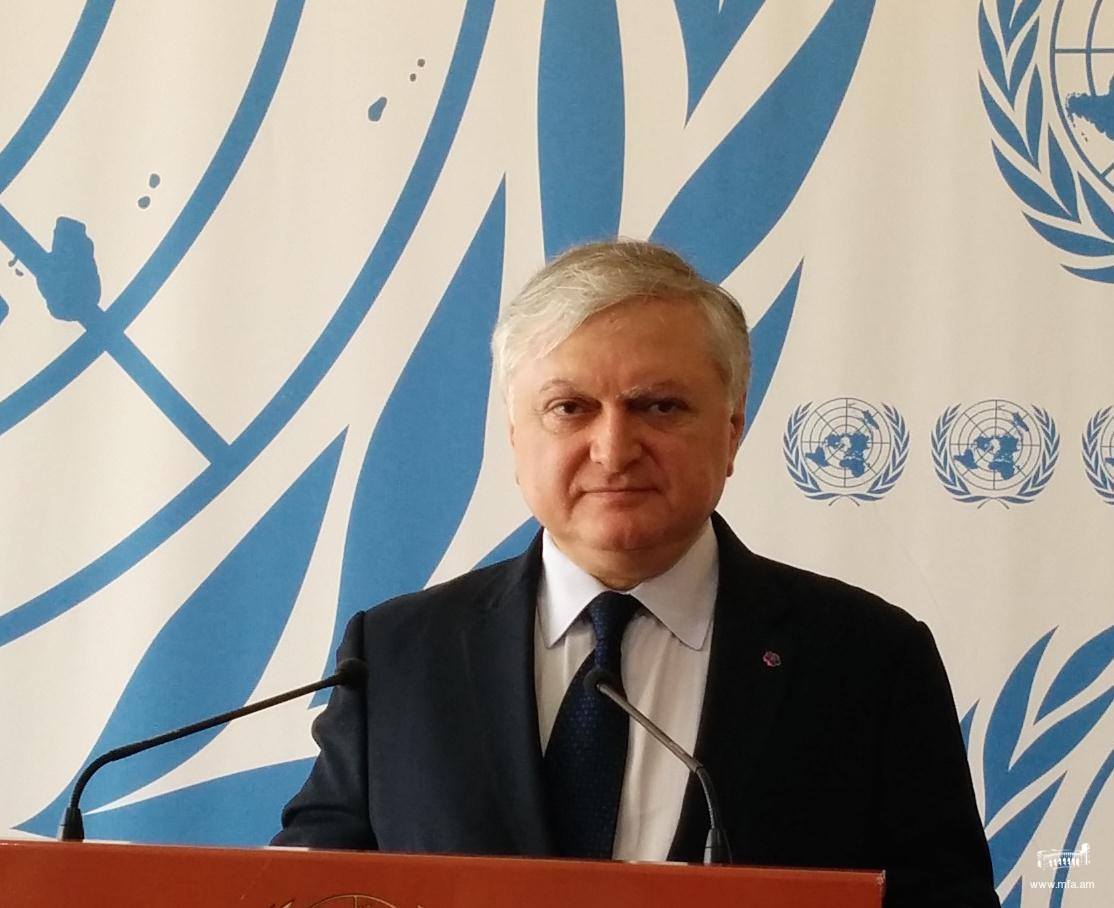Interview of Minister of Foreign Affairs Edward Nalbandian to Radio Liberty (Riga)
22 May, 2015Radio Free Europe/Radio Liberty. Now when EU Eastern Partnership Summit concluded in Riga, negotiations are still continuing, but it seems the works of the Summit have concluded. What can you say, what are the results of Summit for Armenia? It looks like the relatively adjourned process of EU-Armenia is restarting again.
Edward Nalbandian. I would not say “adjourned”, I would rather say the continuous process. Today we have what we was expected. What was stated back on January 20 during Armenia-European Union Cooperation Council session, was reaffirmed, i.e. Armenia and the European Union are willing to continue comprehensive cooperation in all possible areas and directions, taking into account Armenia’s commitments in other integration processes.
And the Joint Declaration of the Eastern Partnership Summit adopted today reads that, that the process, launched with the EU back in November last year, the so called consultations, why consultations and not negotiations, because the negotiating team on behalf of the European Union did not have the appropriate mandate. Now it is becoming clear, that those consultations, that we concluded in March and arrived at common terms, give us an opportunity to launch negotiations soon, what was reflected in the Declaration.
And agreement was reached that the European Union will confirm the mandate of its negotiating team in the near future, and afterwards we will start negotiations over the drafting of new legal framework document for the further development, expansion and deepening of our relations.
In addition, the Declaration mentions yet another significant direction, i.e. the mobility of citizens. The document emphasizes, that in the near future visa dialogue on visa liberalization will commence.
What does this mean? Readmission and Visa Facilitation Agreements (VFA/RA), that were signed with the European Union and entered into force in January, 2014, paved the way for the launch of a new process, which will lead to visa liberalization, i.e. citizens of Armenia will be exempt from obtaining visa to enter the European Union.
We continued negotiations and contacts also for the development of sectoral cooperation areas. The declaration touches upon this in a reference, regarding Horizon 2020 program, concerning scientific research, or fostering of entrepreneurship, particularly, small and medium enterprises, as well as aviation and other fields.
I mean, today we have what was expected.
There were rumors whether an agreement would or would not be signed in Riga. There was no such issue. Yet in January, right after Armenia-European Union Council session, I declared that as soon as the European Union provided mandate to the negotiating team, negotiations would start, document would be drafted, we would come to an agreement, then the document would be signed.
I am a bit surprised that despite official statements made by Armenia and the European Union, they were being noted.
Radio Free Europe/Radio Liberty. But there are good news, aren't there? In fact, there is an approval that the European Commission should launch negotiations. That is already a significant progress.
Edward Nalbandian. European Union submitted positive report to the Council, and the Council should approve the mandate, and I am sure that the mandate will soon be approved, and we will start the negotiations.
RadioFreeEurope/RadioLiberty. Let me raise two questions, if I may. In his speech the President criticized Azerbaijan, saying that Karabakh has nothing to do with the territorial integrity of Azerbaijan. Afterwards, there were here some talks, that Azerbaijan objects to the Karabakh-related articles in that final document. Is this true or not?
Edward Nalbandian. Azerbaijan yet again ended up in isolation. 28 EU member-states and Eastern Partnership states agreed upon including respective wording in the Declaration. The point is to contribute to efforts of the OSCE Minsk Group Co-Chairs, as well as that of the Presidents of the OSCE Minsk Group Co-Chair states, and statements made, since 2009, i.e. statements in L'Aquila, Muskoka, Deauville, Los Cabos and Enniskillen, regarding which we decalred on numerous occasions that our position is in line with the proposals and elements enshrined in those statements.
It is Azerbaijan that up to day said nothing on that matter. This time reference to those statements was included also in the Declaration of the European Union and Eastern Partnership states. Azerbaijan had some issues on that and, in general, on the point on Karabakh settlement. Maybe, for that very reason Azerbaijan’s Foreign Minister left the hall. Some tried to get him back, but failed. In the result of direct talks with Baku, an understanding was reached that the Declaration will be adopted, and Azerbaijan will present its reservation on respective point.
And the Declaration was adopted as it had been agreed upon.
Armenia, European Union member-states and other states of Eastern Partnership shared the view on the matter, while Azerbaijan yet again stood against everybody and ended up in isolation.
Radio Free Europe/Radio Liberty. My last question. Everyone here is discussing that Belarus and Armenia were against “illegal annexation of Crimea” wording. How was the issue resolved?
Edward Nalbandian. Joint Declaration Draft contained a range of definitions, wording, and each state had their own view about them. Obviously, we had our own view. I think, I can not speak on behalf of Belarus, but proposals and ideas suggested by Armenia were received with understanding and most of them were accepted and enshrined in the Declaration.


